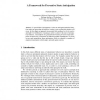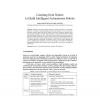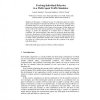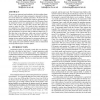550 search results - page 9 / 110 » A Design Process for Adaptive Behavior of Situated Agents |
AAAI
1996
13 years 8 months ago
1996
Procedural representations of control policies have two advantages when facing the scale-up problem in learning tasks. First they are implicit, with potential for inductive genera...
AGENTS
1997
Springer
13 years 11 months ago
1997
Springer
Abstract. A special kind of anticipation is when an anticipated undesired situation makes an agent adapt its behavior in order to prevent that this situation will occur. In this ch...
IROS
2006
IEEE
14 years 1 months ago
2006
IEEE
Information processing within autonomous robots should follow a biomimetic approach. In contrast to traditional approaches that make intensive use of accurate measurements, numeric...
EVOW
2010
Springer
14 years 2 months ago
2010
Springer
Abstract. In this paper, we illustrate the use of evolutionary agents in a multiagent system designed to describe the behavior of car drivers. Each agent has the selfish objective ...
ATAL
2009
Springer
14 years 2 months ago
2009
Springer
We present an argument-based qualitative decision-making framework in which the social values promoted or demoted by alternative action-options are explicitly represented. We show...




